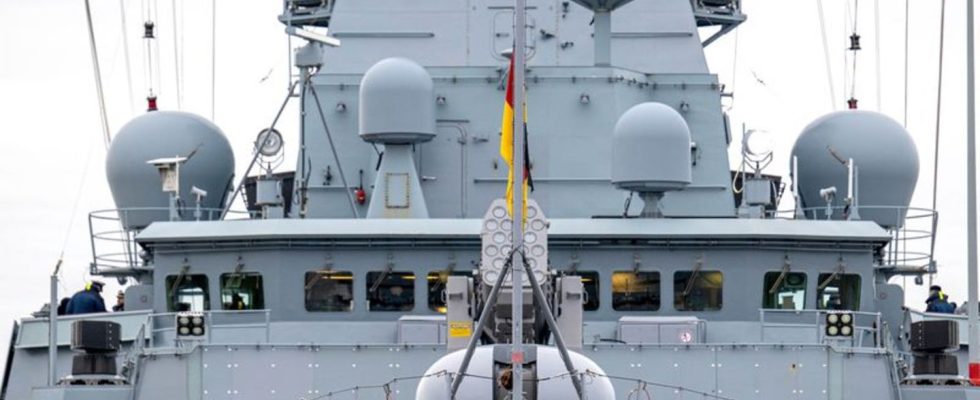Operation Aspides
EU wants to launch military operation in the Middle East
The federal government wants to send the frigate “Hessen” into armed use. photo
© Sina Schuldt/dpa
“The most serious operation by a German naval unit in many decades”: These are the words used by German Vice Admiral Kaack to describe the EU military operation “Aspides”. Now it should start.
What is the mission about?
The primary goal is to protect merchant ships from attacks by the militant Islamist Houthis from Yemen. The militia wants to force an end to the Israeli attacks in the Gaza Strip by shelling ships, which followed the unprecedented massacre by the Islamist Hamas in Israel on October 7th.
Can’t the ships just take a different route?
Theoretically yes. However, the route past the coast of Yemen is by far the shortest when it comes to shipping goods between Asia and Europe. It leads from the Gulf of Aden across the Strait of Baab al-Mandab into the Red Sea and then through the Suez Canal into the Mediterranean. The alternative route around the Cape of Good Hope in South Africa is several thousand kilometers longer – this results in increasing transport costs and delivery delays.
Have consumers in Europe already felt this?
Experts from the EU Commission have not yet observed any significant influence on the prices of goods and energy in Europe. But this could soon change if cargo ships continue to avoid the Red Sea route. Companies in Europe have already had to reduce their production due to delivery bottlenecks – for example, the US electric car manufacturer Tesla at its factory in Grünheide near Berlin.
How does the EU want to protect merchant ships?
The core of the operation will be the presence of European warships, particularly in the southern Red Sea and the Bab al-Mandab Strait. They are supposed to accompany merchant ships and ward off attacks in an emergency.
Will there also be proactive attacks on Houthi targets in Yemen, like those carried out by the USA and Great Britain?
No. The mandate sets strict limits on the use of weapons. Safeguards must be implemented “in full respect of international law, including the principles of necessity and proportionality.”
How is Germany participating?
The federal government is sending the 143-meter-long frigate “Hessen” into armed use – provided that the Bundestag gives the necessary approval this Friday as planned. The ship, which left Wilhelmshaven on February 8th, is equipped with anti-aircraft missiles and was specifically designed for escort and maritime control. There are around 240 soldiers on board.
According to the Bundeswehr, it can use its special radar to monitor airspace the size of the entire North Sea. The weapon systems are capable of engaging targets at a distance of up to 160 kilometers. Germany also wants to provide staff for the operation’s headquarters in Larisa, Greece, as well as helicopters.
How dangerous is the mission for the soldiers?
Since the Houthis have not shied away from attacks on warships in the past, Operation “Aspides” is considered comparatively risky. Marine Inspector Jan Christian Kaack said of the departure of the frigate “Hessen”: “This is the most serious deployment of a German naval unit in many decades.” At the same time, the risks are considered controllable. “There is no unit in the German Navy that is better prepared, better trained and better equipped for this,” says Kaack.

